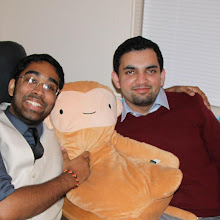I love to write, but being a freelance writer will only get more difficult over time. Most people don't even read newspapers today, which is both tragic and discouraging for someone who wants to be a journalist. I like the idea of being a teacher, but going into education leaves little room for new challenges. Most teachers teach the same grade at the same school for the majority of their careers, and I don't know if I could see myself doing that. The idea of being a doctor also seems appealing, but I have no interest in the subject material required for medical school.
So I'm sure you get the point. Every career path has pros and cons. But what separates one from the rest? Often, I'll talk to some people fortunate enough to know exactly what they want to do after college, and in these conversations I realize individual passions are driving everyone. It seems pretty obvious in retrospect. Whatever you love to do most, you should pursue a career in, right? Well, it's not always so simple. Translating a passion into a career can seem almost impossible at times.
A few months ago, I went to an event in Raleigh, North Carolina. It was one of the biggest video game tournaments in North America, and I was lucky enough to talk to many professional video game players about how they turned a passion for video games into a sustainable career. One of my favorite pro gamers, Jonathan Garneau, who is a French Canadian Starcraft 2 player, told me about his interesting path to pro gaming.
He was a regular teen growing up in Canada, and he was into video games like many people his age. At some point during high school, he began to play a variety of different computer games. He was especially intrigued by the popularity of Starcraft in Korea. When he tried to emulate the professional players players, he soon realized that his hands literally were not fast enough to keep up with them. To make up for this, he practiced a few hours a day with what Korean players called "APM Drills" (Actions per minute). Most Korean players could reach up to 500 actions per minute.
His friends and family members were concerned about the amount of time he spent playing video games, as most would be. His interest in video games began as a hobby, which was socially accepted by his friends and family. By the end of high school it became his passion, which was more difficult for his parents to deal with. He was practicing daily, and he was determined to go to international tournaments. Although he was never able to make it to Korea for any major Starcraft 1 tournaments, he was making a living by going to small tournaments, and he was even able to sign a contract with a sponsor. He met people at starcraft tournaments all around the world who shared his love for this video game. He was enjoying his life and making a living doing something he loved.
Once Starcraft 2 came out, he signed another contract with a new sponsor and became one of the best players in the world, which was the reason he was invited to compete in Raleigh (the first major, North American Starcraft 2 tournament). The prize pool was several thousand dollars, and he placed second. Since then, he has qualified for the biggest tournament in the world, which is to begin in South Korea a few weeks from today.
I know some of you may be thinking that pro gaming isn't the best example, but it illustrates exactly the point I'm trying to make. Jonathan was truly passionate about something that seemed impossible to make a career out of. The people who would usually support his decisions told him he would never make it. He was the subject of much ridicule by many of his friends and family, but through everything he stuck with it. He met more people who shared similar stories, and it motivated him even more. This kind of passion transcends all boundaries and limitations set by society. This is the kind of passion that I want to have one day.
If you haven't figured out what you want to do after college yet, don't fret. There are many others like you and me out there. Despite what anyone else tells you, this is what a college education is for. I am confident that as I explore the many different areas of study here at William and Mary, I'll find something I am truly passionate about. As long as you keep your mind open, you will find your passion, too.

No comments:
Post a Comment